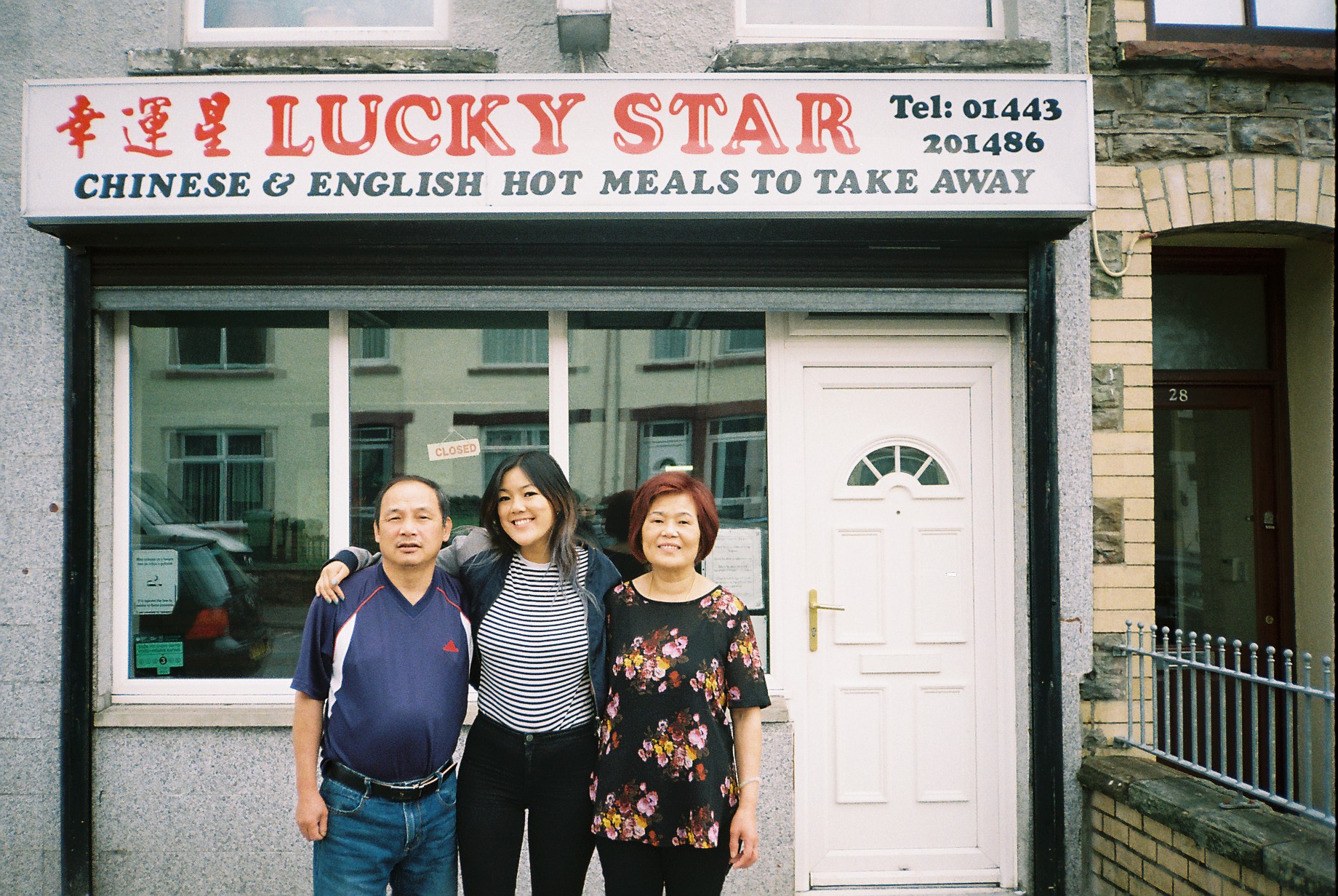
A Robbed Childhood Growing Up Behind the Chinese Takeaway Counter
Growing up in a Chinese takeaway in rural south Wales, Friday nights were spent behind the counter instead of out with friends. Author and journalist Angela Hui reflects on the mixed emotions of life in Lucky Star, her family's takeaway, ahead of the release of the paperback edition of her book Takeway this summer.
Angela Hui | 31.05.23
“Lucky Star, how may I help you?” I would say over 40 times a day, seven days a week, as I manned the phone of my parents’ small Chinese takeaway in the rural south Wales Valleys. It was one of those hole-in-the-wall joints that looked like a time capsule with faded floral tiles, red brick walls, jade plants pushed up against the window and a golden waving cat on the shelf behind the counter that had their paw raised.
I hung up and walked down the hallway towards the kitchen to stub the paper ticket on a makeshift ticket spike that my dad had fashioned out of a plank of wood and some nails. I yelled to my parents who were manning the woks and deep fat-fryer over the loud whirring extractor fans. “One sweet and sour chicken balls, one large egg fried rice, special chow mein and chips.” and they replied “mm, okay lah, ah mui (my family nickname).” without turning their backs.
I returned to my post sullenly. Stamping loudly with every step to make my point across to my parents that I clearly didn’t want to be here, but they were too busy cooking orders to hear or notice my strop. I spent my Friday nights serving and waiting on others while the rest of the world seemed to keep going. I quietly moped behind the counter feeling sorry for myself. One hand resting on my cheek and the other viciously tapping away on the counter, eagerly watching the wall clock tick in hope of making time go faster so that my shift would be over. I looked out of the shop windows bored out of my skull, watching passersby going about their evenings. Where were they headed? Are they meeting friends? How come they’re dressed up fancy? I fantasised about strangers’ lives daily about how we could swap lives. I wished I was free of obligations, free of responsibilities and free to live my life. For many, our unassuming Chinese takeaway was merely a place to satisfy their hunger, but for me, it was the backdrop of my childhood — a childhood that I often felt robbed of its innocence and opportunities of my formative years.

Our Chinese takeaway, with its bright red and white sign, became a symbol of the melding of my two disparate worlds. The lion foo dog decorations sitting on the shelves connected me to my Chinese heritage while the rolling green hills of the rural South Wales valleys served as a lush backdrop that painted a contrasting picture. My parents migrated from Hong Kong and China to the UK in 1985, seeking a better life. They followed wherever there was work and lived above restaurants that provided accommodation, eventually saving enough money to buy their own place and settled in Beddau, a small Welsh mining town in 1988. Lucky Star became our livelihood, the tantalising aromas of sizzling stir-fries and the clatter of woks filled the air, mingling with the thick sing-song valleys accent and the occasional yelling of a Cantonese phrase. For better or worse, this was home, and it was a constant reminder of the unique space we occupied.
I often found myself roped into the responsibilities of the family business. Evenings were spent packing orders and assisting my parents, leaving little time for play or exploration. While my classmates hung out at parks, attended rugby matches and revelled at birthday parties, I visited wholesalers, served customers and juggled schoolwork. Growing up above a takeaway and sharing a room with my two brothers meant that there was no privacy or autonomy. I didn’t have a space to escape the stresses of school, a break from the takeaway and alone-time from the family, which made me anxious, insular and shy. Blurred lives where boundaries don’t exist. The laughter and carefree spirit that characterised my classmates’ childhood seemed elusive to me.
The duality of my Chinese heritage and Welsh birthplace made it challenging for me to forge a cohesive sense of self. In a town where diversity was practically non-existent, I became the embodiment of "otherness” and walked around with a target on my back. I struggled trying to juggle my identity and sense of belonging. I longed to fit in, to be understood and to be recognised for being more than just the Chinese family living in a Chinese takeaway.
Being one of the few Chinese families in the town, we faced a language barrier that intensified our feelings of isolation and became another hurdle. While my parents worked tirelessly to support our family despite not knowing English or having an education, their limited English skills prevented them from getting to know neighbours properly, hiring staff or fully engaging with customers. My parents often relied on me and my brothers as their translator, burdening us with responsibilities that exceeded our young years, forcing us to grow up and be the parent to our parents. I watched passerby after passerby going about their lives from the periphery of our takeaway window, nursing a sense of bitterness, jealousy and resentment. I felt lonely, alienated and longed for others to understand what I was going through.
"Our Chinese takeaway, with its bright red and white sign, became a symbol of the melding of my two disparate worlds. The lion foo dog decorations sitting on the shelves connected me to my Chinese heritage while the rolling green hills of the rural South Wales valleys served as a lush backdrop that painted a contrasting picture."

When my parents sold the shop in 2018, I started to reflect on those times with a mix of fondness, nostalgia and sadness. All teenagers go through growing pains as they figure out what they want to do with their lives, but for me, there was often a feeling of being misunderstood. I think that was the nature of being a Welsh Chinese young woman living in a small village, working in a close-knit family team and being the face of the takeaway dealing with racism while I worked behind the counter. I mourned the loss of our takeaway and grieved for something that was such a huge part of my life.
As I got older, I finally understood and realised how hard my parents worked. The long, gruelling hours of running their own business. Working seven days a week, 364 days a year, closing only on Christmas day, while trying to navigate a new environment, but that never wore them down – either physically or emotionally. My parents always kept their heads down and ploughed on regardless of whatever life threw at them.
I’ve always felt a justified familial obligation to help out. I knew that everything my parents did was for us, they cooked to put food on the table and a roof over our heads. They sacrificed everything so that we could have a comfortable life and a chance at higher education. My parents wanted me and my brothers to know how hard it was to earn money, and that immigrants had to work twice as hard to make ends meet. Some call it child labour, but I call it instilling values. Amidst the rollercoaster ride of our unconventional childhood, I’ve learned to appreciate the strength and resilience that this unique upbringing has instilled in me.
I can still recite the numbers of our most popular takeaway dishes off by heart, permanently etched into my brain. I still bear scars, souvenirs of hard work and hot chicken ball oil splatters. My thumbs, always rough and chapped, carry the tactile remnants of countless cuts inflicted by the stubborn silver containers. I’ll never forget the painful ache of being on my feet all day and night for an unfathomable 14 consecutive hours, which still reverberates within me. Although I felt robbed of my childhood at the time, it’s shaped the person I am today. Growing up and working in a Chinese takeaway has given me a strong sense of work ethic, people skills from serving customers and the ability to handle difficult situations with ease that I use in my day-to-day life. For the longest time, I always felt that our shop was a burden rather than a blessing, but now I see it the other way round. I wouldn’t have had it any other way.
Angela Hui is an award-winning journalist, editor and author of Takeaway: Stories from a Childhood Behind the Counter (2022). Her work has been published in gal-dem, Guardian, Financial Times, HuffPost, Independent, Lonely Planet, Refinery29, Vice, and among others. She is currently freelance and was the former editor at REKKI, a free app transforming the way chefs order ingredients and former food and drink editor at Time Out.
Pre-order a paperback copy of Takeaway: Stories from a Childhood Behind the Counter here
